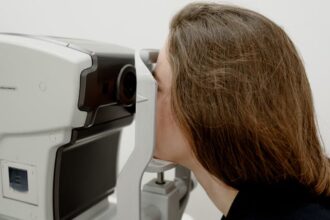A groundbreaking collection of four papers published in the May edition of Brain Medicine has brought together growing evidence that microplastics from ultra-processed foods may be accumulating in the human brain, potentially contributing to the global rise in depression, dementia, and other mental health disorders. These papers offer the most comprehensive examination of how these tiny plastic particles could affect brain health through multiple interconnected biological pathways, opening up urgent new questions about the actual impact of modern diets on our minds.
The striking cover of Brain Medicine’s May 2025 issue features an image of a human brain speckled with vibrant microplastic particles beside a plastic spoon — a potent visual representation of the collection’s core finding that human brains may contain approximately “a spoonful” of microplastics. This theme is explored in depth across the four papers, which include a viewpoint article synthesising emerging evidence of microplastic accumulation in the human body and its potential links to mental health, alongside three new documents that expand on this research.
The featured viewpoint article by Dr. Nicholas Fabiano and colleagues proposes a novel hypothesis connecting ultra-processed food consumption, microplastic exposure, and mental health outcomes. Dr Fabiano notes that ultra-processed foods now make up more than half of energy intake in countries like the United States and contain far higher levels of microplastics than whole foods. Recent studies have shown that these tiny particles can cross the blood-brain barrier and accumulate significantly, suggesting a worrying link between modern diets and brain health.
This hypothesis gains weight from existing evidence showing ultra-processed food consumption’s adverse mental health effects. A recent umbrella review in The BMJ found that people who ate ultra-processed foods had a 22% higher risk of depression and a 48% higher risk of anxiety compared to those who ate more whole foods. What makes the current hypothesis particularly intriguing is that microplastics — particles smaller than 5mm — may be a crucial but previously overlooked link in this relationship, with heavily processed foods such as chicken nuggets containing up to 30 times more microplastics per gram than fresh chicken breasts.
Dr Wolfgang Marx highlights that ultra-processed foods and microplastics share biological mechanisms that could harm mental health, including inflammation, oxidative stress, mitochondrial dysfunction, and disruptions to neurotransmitter systems. The viewpoint article suggests the creation of a Dietary Microplastic Index (DMI) to quantify exposure to these particles through diet, setting the stage for a more rigorous investigation into their potential role in the observed adverse mental health outcomes associated with ultra-processed food consumption.
Alongside this, a Brevia research paper by Dr Stefan Bornstein explores the possibility that therapeutic apheresis — a blood-filtering technique — could remove microplastics from human circulation. While much more research is needed to confirm its viability, it points to a possible pathway for mitigating microplastic accumulation. The issue concludes with a passionate guest editorial by Dr. Ma-Li Wong, who warns that if microplastics can cross the blood-brain barrier, the traditional boundary between the human body and environmental contaminants has already eroded. The authors call for urgent further investigation and underscore the need to reduce ultra-processed food intake and identify ways to detect and remove microplastics from the body, emphasising that these environmental threats may have more profound implications for our mental well-being than previously understood.
More information: Ma-Li Wong et al, Una cuchara de plástico en tu cerebro: The calamity of a plastic spoon in your brain, Brain Medicine. DOI: 10.61373/bm025g.0062
Journal information: Brain Medicine Provided by Genomic Press








